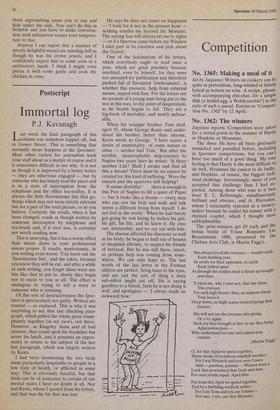Postscript
Immortal log
P.J. Kavanagh Last week the final paragraph of this column was somehow lopped off, lost in Gower Street. This is something that normally never happens at the Spectator. Most other outlets for journalism hack your stuff about as a matter of course and it is sometimes difficult to see why. It is not as though it is improved by a better writer — they are otherwise engaged — but by someone who has barely read the piece and is in a state of interruption from the telephone and the office tea-trolley. It is always the little flavoursome bits that go, things which may not seem strictly relevant but are a part of the total picture, or so you believe. Certainly the result, when it has been changed, reads as though written by someone interrupted by telephone and tea-break and, if it ever was, is certainly not worth reading now.
This is annoying, but it has a worse effect than minor dents in your professional amour propre. It results, mysteriously, in you writing even worse. You leave out the 'flavoursome bits', and the jokes, because you know they will be cut, and after a while of such writing, you forget there were any bits like that to put in, slowly they begin not to occur to you at all. The effect is analagous to trying to tell a story to someone who is yawning.
Of this sort of destructiveness the Spec- tator is spectacularly not guilty. Writers are trusted — or replaced. This is why it was surprising to see that last clinching para- graph, which pulled the whole piece trium- phantly together (in my view), not there. However, as Kingsley Amis said of bad reviews, they could spoil his breakfast but never his lunch, and it presents an oppor- tunity to return to the subject of the last lost paragraph, which was largely written by Keats.
I had been mentioning the way birds seem particularly hospitable to people in a low state of health, or afflicted in some way. This is obviously fanciful, but that birds can be of assistance to certain of our mental states I have no doubt at all. Nor had Keats, whom I quoted from his letters, and that was the bit that was lost. He says he does not count on happiness — 'I look for it not in the present hour — nothing startles me beyond the Moment. The setting Sun will always set me to rights — or if a Sparrow come before my Window I take part in its existince and pick about the Gravel.'
One of the fascinations of his letters, which everybody ought to read once a year, which are great precisely because unedited, even by himself, for they were not intended for publication and therefore packed full of flavoured 'irrelevancies', is whether this resource, help from external nature, stayed with him. For the letters are an account of a young man being put to the test in this way, to the point of desperation, as his health begins to fail. They are a log-book of mortality, and nearly unbear- able.
When his younger brother Tom died, aged 19, whom George Keats said under- stood his brother better than anyone, Keats wrote to George: 'I have scarce a doubt of immortality, of some nature or other — neither had Tom.' But after the terrible, claustrophobic ship-journey to Naples two years later he writes: 'Is there another Life? Shall I awake and find all this a dream? There must be we cannot be created for this kind of suffering.' Were the sunsets and the sparrows still helping?
It seems doubtful:`. . . there is enough in this Port of Naples to fill a quire of Paper — but it looks like a dream — every man who can row his boat and walk and talk seems a different .being from myself. I do not feel in the world.' When he had barely got going he was losing by inches his girl, his gift, his life, and he knew it. He cries out, intolerably, and we cry out with him.
The disease affected his character as well as his body: he began to huff out of houses at imagined affronts, to suspect his friends of betrayal. But he was still there, intact, so perhaps help was coming from some- where. We can only hope so. The last words of the last letter in the Forman edition are perfect, bring tears to the eyes, and are just the sort of thing a dozy sub-editor might cut off. He is saying goodbye to a friend, feels he is not doing it well, and apologises — 'I always made an awkward bow.'














































 Previous page
Previous page